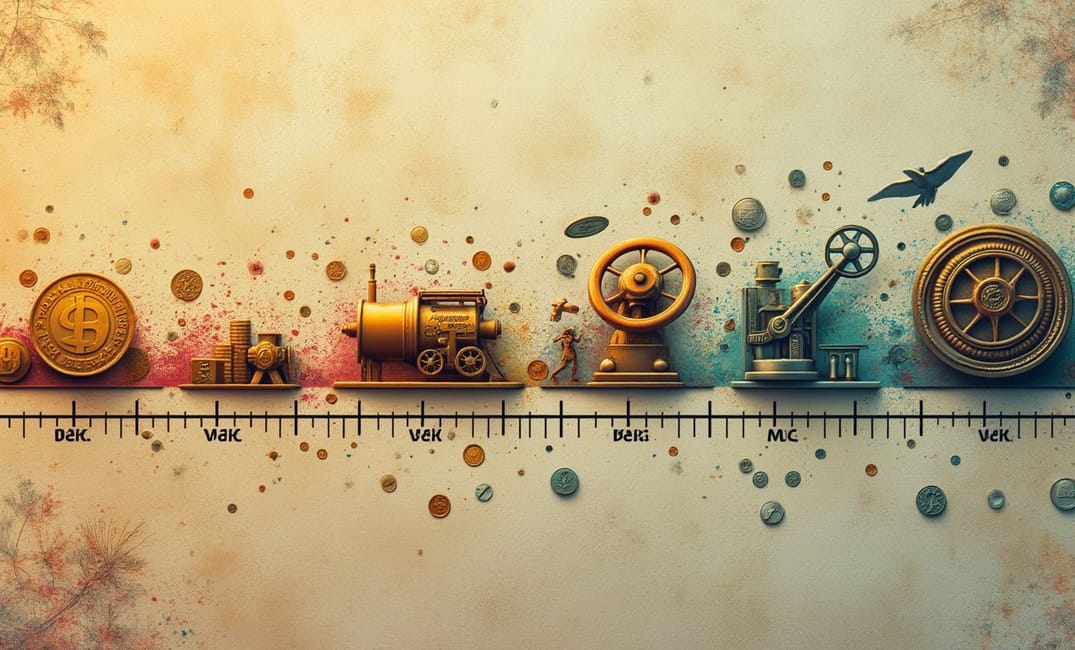Introduction: Crafting Human Exchange and Enterprise
The history of human enterprise and economic evolution is a saga of adaptation, ingenuity, ambition, and survival. From the rudimentary barter systems of early communities to the intricate global networks of modern finance, economic systems have shaped the contours of civilizations and the destinies of nations. This entry delves into humanity’s economic journey, revealing insights into the persistence of human endeavor and the quest for prosperity and innovation.
Genesis of Economic Systems
Primordial Barter and Trade
- Barter Beginnings: Early nomadic tribes utilized barter as a primary means of trade, exchanging goods and services based on reciprocal needs. While simple, this system required a "double coincidence of wants," propelling societies toward more sophisticated economic solutions.
- Early Marketplaces and Trade Routes: As communities settled and societies matured, trading evolved into organized marketplaces. Regions like Anatolia and Mesopotamia became bustling centers of trade, facilitating cultural exchanges and fostering economic growth through shared resources and skills.
From Barter to Currency
- The Advent of Money: To address barter's limitations, early civilizations introduced currency – tangible goods like grain, cattle, or precious metals that symbolized value. Notable examples include Mesopotamian shekels, Egyptian deben, and the Chinese use of cowrie shells.
- Coinage and Standardization: The invention of metal coins around 600 BCE in Lydia standardized value exchange, simplifying transactions and enabling long-distance trade. Coins were valued not only for their material worth but also their political symbolism, carrying imagery that reinforced rulers’ power and unity.
The Evolution of Economic Thought
Classical and Medieval Economics
- Philosophical Foundations: Ancient Greek philosophers like Aristotle pondered economic concepts such as value, wealth, and justice, influencing later economic doctrines. In medieval eras, scholastics like Thomas Aquinas integrated economic discourse into moral philosophy, emphasizing fairness and social responsibility.
- Mercantilism and State Power: Emerging in the 16th century, mercantilism advocated state regulation of trade to build national wealth through surplus exports and colonial expansion. This strategic focus on accumulating precious metals shaped European colonial policies and conflicts.
Emergence of Economic Theories
- Classical Economics and Laissez-Faire: The 18th-century saw the rise of classical economics, with figures like Adam Smith championing free markets and rational self-interest as catalysts for prosperity. His seminal work, "The Wealth of Nations," laid groundwork for free-market capitalism and the invisible hand concept.
- Marxism and Alternative Ideas: In the 19th century, Karl Marx critiqued capitalist structures, highlighting class struggles and advocating for socialism where the means of production were communally owned. Marxism profoundly affected political ideologies and revolutionary movements globally.
Industrialization and Globalization
The Industrial Revolution
- Technological Innovation: The Industrial Revolution ignited unprecedented changes, shifting agrarian economies to industrial powerhouses through mechanization, steam engines, and factory systems. This epoch transformed labor dynamics, urbanization, and spurred economic growth.
- Market Expansion and Consumerism: Industrialization catalyzed consumer markets, further fueled by advances in transportation and communication. This era saw the rise of consumer culture, with greater accessibility to goods and services defining societal progress and quality of life.
Global Trade and Economic Integration
- Trade Networks and Multilateralism: Post-industrial globalization interconnected national economies, propelled by trade networks like the British Empire's mercantile system. The 20th-century's multilateral institutions, like the IMF and WTO, aimed to foster economic stability and equitable global trade.
- Neoliberalism and Deregulation: The late 20th century marked a neoliberal shift advocating minimal state intervention, deregulation, and privatization as means to enhance efficiency and growth. This paradigm expanded globalization but also instigated debates about inequality, labor rights, and environmental impact.
Contemporary Economic Challenges and Opportunities
Sustainable and Inclusive Economies
- Green Economics and Circular Models: Modern economies confront challenges of ecological sustainability, promoting green economics and circular models where resource efficiency and resilience are paramount. Investing in renewable energies and sustainable production fosters long-term viability.
- Inequality and Fair Trade: Despite growth, income disparity and its ramifications persist, prompting advocacy for inclusive growth through fair trade, equitable policies, and investive diversity. Ethical consumerism and corporate social responsibility play roles in fostering equitable markets.
Technological Innovation and the Digital Economy
- Digital Transformation: The digital revolution reshapes traditional industries, introducing e-commerce, financial technologies, and data-driven services promising efficiency. Yet, this rapid change necessitates considerations for data security, privacy, and digital divides across socioeconomic spectra.
- Gig and Knowledge Economies: The rise of the gig and knowledge-based economy redefines labor landscapes, where freelance, remote, and intellectual work thrive. Balancing innovation and social protection involves ensuring labor rights and fostering educational accessibility for continual skill development.
Conclusion: Charting the Future of Human Prosperity
The odyssey of human economic ingenuity highlights civilization's adaptability in overcoming temporal challenges. As societies evolve, striking harmony between innovation, equity, and sustainability becomes imperative. Embracing diversity, fostering ethical principles, and cultivating interdisciplinary collaborations will be instrumental in navigating future economic landscapes towards prosperity and resilience for all.
"In the ledger of human history, economic enterprise chronicles not just the pursuit of wealth, but the endeavor for shared prosperity, collaboration, and the creation of a sustainable tomorrow."
SUSTAINABLE ECONOMIES, INDUSTRIAL REVOLUTION, ECONOMIC HISTORY, DIGITAL ECONOMY, ECONOMIC THEORIES, TRADE NETWORKS, BARTER SYSTEMS, GLOBALIZATION

